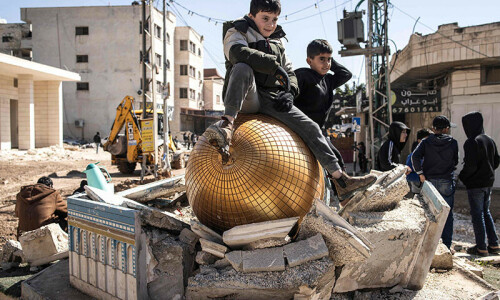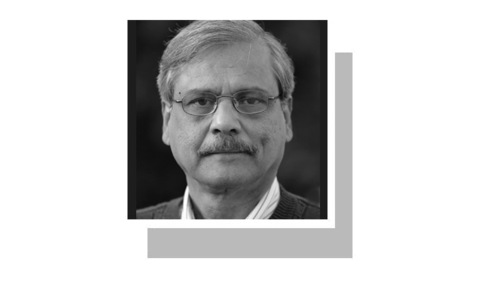TALKING to the media outside the Islamabad High Court recently, Imran Khan said he would get more dangerous. He has lived up to his words, turning himself into a nightmare for his erstwhile patrons.
The former prime minister has challenged the security establishment in way not done before. Matters have gone beyond the bitterness of being dumped.
Khan has now taken the battle to the citadel. His latest public speech has put to rest all speculations about a possible reconciliation. The security establishment now finds itself pitted against a powerful populist force and a cult that it once itself propelled. A lethal mix of popular support and Khan’s imperiousness has indeed made the PTI chief extremely dangerous. The project has gone wrong and diminished the establishment’s role as the final arbiter of power.
Moreover, a breakdown of democracy may mark the unravelling of the existing political order. A weak political set-up cannot withstand this worsening crisis of state.
Like other populist leaders, Khan has successfully built a narrative that political elites are corrupt and that the people need better representation, but has made very few policy commitments beyond this criticism. He has managed to cover up the misgovernance of his four years in power with his populist rhetoric for change.
Khan has cleverly exploited the increasing public distrust of political parties and politicians, especially given the various corruption scandals involving the top leadership. The failure of other mainstream political parties to meet public concerns and respond with distinct policies has also contributed to the public’s alienation. The public sees most political parties as family enterprises only serving the interests of their members.
The hybrid experiment has come back to haunt the establishment.
Indeed, the military establishment too had a role in building this perception against politicians and projecting Khan as an alternative. A hybrid arrangement tried to prop up a weak coalition. But all efforts failed to provide political stability, and instead, caused the weakening of the democratic political process in the country.
Now the experiment has come back to haunt the establishment. The unpredictable cricketer-turned-politician could not be controlled. The Khan government fell, with the establishment withdrawing its support. It’s not surprising to hear that many establishment assets used in the past to project Khan’s ‘messiah’ image have now turned against their former masters with the institution changing tack. It’s an old game that has been played many times in our political history. But no lesson has ever been learnt.
Read: Delayed selection, early polls — can Imran get what he wants?
With his charisma and mass support, Khan has proved to be a deadlier adversary after being driven out of power. He has not only targeted the new incumbents but has also taken the military leadership head on, accusing it of being part of the so-called foreign conspiracy aimed at regime change. He has weaponised ultra-nationalist rhetoric, mixing it with religion.
Like other populist leaders, he has managed to mobilise support across the board — from the educated urban population to the lower middle class and conservative religious elements. He is in a unique political position; while being in opposition, his party controls power in the country’s most powerful province, Punjab, and also in KP. That gives him the kind of advantage which no ousted leader had before. It is a unique phenomenon in Pakistan’s political history.
Most worrisome is that he has discredited formal institutions thus undermining the democratic process. Like other populist leaders, he has an authoritarian mindset that wants to see all state institutions subservient to his whims. His so-called anti-establishment rhetoric is also driven by his desire to control the institution.
It is apparent that Imran Khan doesn’t want the security establishment out of politics but to intervene in his support. His opposition to the current government appointing the new army chief shows a desire for a ‘loyal’ military chief — not taking any lesson from history that a military chief serves only the institutional interest. By making the appointment of army chief issue controversial, Khan has made his own position weaker.
By upping the ante, Khan sought to bring the establishment under pressure but it doesn’t seem to be happening. Notwithstanding its diminishing power, the establishment is still strong enough to undermine Khan’s bid to return to power. In fact, his recklessness has caused the establishment to close ranks.
In the appointment of a new chief, any campaign to make the process controversial is taken very seriously by the establishment.
Editorial: Imran’s fulminations have made COAS appointment controversial to an unprecedented degree
There is a tangible sense of frustration in Khan’s tenor, with no indication yet of the government conceding to his demand for early elections. His worries seem to have increased with the sword of disqualification dangling over him in the contempt case. The Islamabad High Court is set to formally charge him in the case.
Things could turn more serious with no indication yet of Khan extending an unqualified apology.
Khan has threatened to march on Islamabad early next month to force the government to call elections. He also wants the appointment of the army chief deferred till the new government is formed after elections. It’s an unprecedented demand that has no constitutional provision. He has also indicated that he may agree to extending Gen Bajwa’s term. Such contradictory statements show a confused mind.
There must not be any talk about an extension for the army chief. Dragging the military deeper into politics is damaging not only to the country but also the institution. The ongoing crisis has brought to the surface the fault lines inherent in our system. The establishment’s involvement in the power game and political manipulation has cost the country hugely. What’s happening now is also the result of the game the establishment has been playing.
There is certainly no winner in this game of thrones, with no viable political recourse available. It’s questionable whether even fresh elections in this highly volatile and polarised atmosphere can bring stability. The country is moving towards complete anarchy with the erosion of authority of most state institutions. A meaningful dialogue among political forces is the only way out of the situation. The perception that democracy has failed only helps the forces of authoritarianism.
The writer is an author and journalist.
Twitter: @hidhussain
Published in Dawn, September 21st, 2022













































